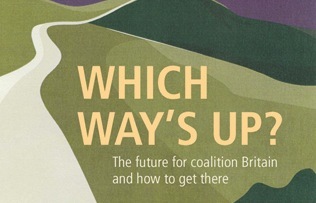
What I find so depressing about this book is that so few politicians and journalists have bothered to read it. A couple of days ago I popped in to the Commons for dinner. As I still had Boles’s book in my pocket, every time I bumped into ministers and senior journalists I asked if they had read it. Not one had. This is as remarkable as it is worrying. There are too many people who moan that they don’t know what the Coalition stands for or how it ticks. For those who really want to know – for those, of all parties, who really care about this country and her peoples – this book should be compulsory reading.
The glory of Which Way’s Up? is that there is something in it for everyone. Even the Hitchcockian mound that is Simon Heffer could not disagree with much of it. And the Gothic figure of Norman Tebbit might just manage a smile when he reads the quote from Margaret Thatcher in the 1980s, “I would not mind betting that if Mr Gladstone were alive today he would apply to join the Conservative Party”. Although his smile would be more like the brass plate on a coffin.
This book is both the midwife and blueprint of Coalition thinking. It trumpets the fact that Conservatives have more in common with the Liberal Democrats than most of us had never even dreamed of. Boles sets it out thus:
“Our commitment to personal freedom and our shared suspicion of socialist Utopias, means that we would never be duped by the left’s claims that the government action can make people equal … Britain’s future prosperity … rejects the ideological posturing of both the Luddite left and the ultra free market right in favour of hard nosed pragmatism and a realistic assessment of Britain’s competitive advantages.”
It is the way that Boles deals with free markets that strike a chord with both right and left. He quotes the former chairman of the Federal Reserve, Alan Greenspan:
“I made a mistake in presuming that the self interest of organisations, specifically banks, is that they were best capable of protecting shareholders and equity in the firms … I discovered a flaw in the model that I perceived is the critical functioning structure that defines how the world works. I had been going for forty years with considerable evidence that it was working exceptionally well.”
So the thesis is clear and rather obvious. There are some areas where free markets consistently produce inferior outcomes. “Even under Thatcher and Reagan, free markets were never unbridled or as ubiquitous as either their supporters or opponents liked to pretend.” Too right matey.
And for those who reach either orgasm or apoplexy at the mere mention of the word “Europe”, comfort can be taken with the following:
“We must resist measures that might undermine the fund managers, insurance companies, private equity firms and hedge funds who played little part in the financial crisis and who are poised to attract the savings of the new global middle class. The EU Hedge Fund Directive is a good example. If our European partners do not listen to the British government’s arguments, we should follow the French or Italian example and refuse to implement any regulations that would harm our national interest.”
Now, not even Cash, Carswell and Hannan could disagree with that.
But where this book is at its boldest is its plans for a massive decentralisation of power to local communities, whether it be in health, education or local government. What’s more, he wants such decentralisation entrenched and almost irreversible, to be reversed only with a massive majority of both houses of Parliament:
“Thatcherite Conservatives have tended to focus on the size of the state as measured by the percentage of GDP consumed by public spending and tax. Liberal Conservatives are more interested in the power of the state and its lack of accountability.”
Boles undermines an idea that seems to be gaining a degree of traction of late: namely, that Team Cameron, being fairly well off, have no understanding of how the hardworking, struggling, poor live. He wants to restore a society in which the poor do not inhabit a totally different world to the rest. On his account, we can, by changing institutions and habits of behaviour, provide the social glue to make society much less polarised.
But the guiding theme of this book is an old quote from Bobby Kennedy:
“GNP measures neither our wit nor our courage, neither our wisdom nor our learning, neither our compassion or our devotion to our country. It measures everything, in short, except that which makes life worthwhile.”
It’s the old French philosophy of décroissance: there’s more to life than money.
This book is a masterpiece of pragmatic political thinking that is achievable. Anyone with an interest in how we are governed should read it.
Yet there is on suggestion on dealing with world trade that I find as welcome as a rat sandwich: appointing Peter Mandelson as President of the Board of Trade. The trouble with that man is that he is not unlike the Andes Aircrash Cookbook; fascinating, ghoulish and in the worst possible taste.
But apart from the Mandelsonian heresy, this is a book that is very readable, buries tribalism and steers the country away from entrenched orthodoxies that have failed us all.






Comments